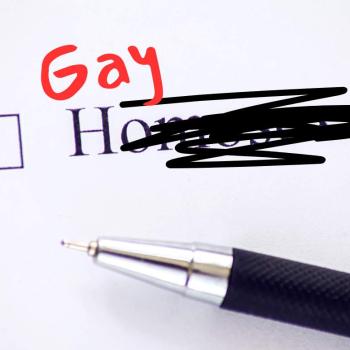In Part I of this series, I discussed how many within “mainstream” Western Christianity believe the LGBT community—more specifically, the recent SCOTUS decision on marriage equality—is to blame for the imminent judgment on America. In this entry, I would like to mention how those in the Muslim faith appear to be included among those charged with causing the “fall of America.”
The hyperbolic rhetoric used to talk about over 1.6 billion Muslims is just as head-scratching as that which is used to describe the roughly9 million LGBT Americans. Radio host Rick Wiles recently stated that “millions of Americans will die in one day in this country” at the hands of Muslim-Americans, whose only goal is “to slaughter the people who do not convert to Islam.” We hear statements like this over and over, predominantly by those on the Christian right. I do not wish to demonize those who make such claims, but what I do want to do is shed light on the fact that this is nothing more than extreme hyperbole. Sure, there are those for whom that statement would be true. However, as I will point out in the following paragraph, this is not the goal of the Muslim faith. Furthermore, a statement like Wiles’ is a double-edged sword. Given his logic, one could point to recent Lafayette shooter, John Russell Houser, who, in 2013 tweeted, “The Westboro Baptist Church may be the last real church in America (members not brainwashed [sic])” and conclude, “the goal of Christianity is to slaughter the people who do not accept Christ.” Both claims are nonsense.
The goal of any religion, broadly speaking, will depend upon how one interprets matters. Some religions have sacred texts. Some don’t agree on what is supposed to be “sacred text.” Some religions have varying views of God, or gods, if the case may be. The Muslim faith, then, is no different. Sure, on one extreme, is ISIS (and groups similar). They have a specific goal in mind, which involves radical violence. On the other hand, however, you have a group like the Sufi Muslims. One such Sufi is Bawa Muhaiyaddeen, whom I mention in my forthcoming book, All Set Free. His understanding of Islam is beautifully summed up in the following:
Peace, unity, equality . . . when we are in one place, when we live in one place, eat in one place, sleep in one place, and when we finally join together in heaven in one place, that is unity. Even when we go to that (final) place, we all live together in freedom as one family, one group. In this world and in the next world we live together in freedom, as one family of peace. This is Islam. If we find this way of peace, this is Islam. – (Muhaiyaddeen, God’s Psychology, 218)
There should be no denying the plain truth that within various faiths, there are debates among adherents as to what constitutes “correct theology.” Just because a Christian makes an ethical, moral, or theological claim or performs a “God-mandated” action, does not mean all Christians are in agreement. Likewise, just because a Muslim makes an ethical, moral, or theological claim or performs an “Allah-mandated” action, does not mean all Muslims are in agreement either. (“Allah,” it must be noted, is an Arabic word simply meaning “the One God,” and is used by Arab Christians as well as Muslims). There seems to be a more accurate common denominator for the violence.
It does not matter if God is named YHWH or Allah, Zeus or Athena, if s/he is believed to be violent, then those who follow will likely be more tolerant of violence. In fact, in more extreme cases, followers of that god will eagerly engage in violence themselves. One problem with this belief is that when violence is justified—when an eye for an eye is how those religious interpretations operate for individuals and nations—they will, in reality, often ramp up the violence. (See the studies done by the University of Texas—sourced from Hardin, The Jesus Driven Life, 142–43).
This leads to all manners of madness!
This also seems to be the case with the perpetual conflict in the Middle East.
So, what is the answer to this conflict that seems to never end? Well, I believe Jesus gives us the answer to that question—do not engage in retributive violence. Or, directly in his words: “Do not resist an evildoer” (Matthew 5:39).
Although the blame for the violence should be equally shared with all who engage in the violence, the supposed “Christian nation” should at least model what a Christ-like foreign policy looks like. Should it not? Yet, the United States seems to be right in the middle of the violence—not “set apart” from others who are involved. If leaders truly want the United States to be known as a “Christian nation,” should they not “turn the other cheek?” Should the United States not love those labeled “enemy?”
I realize the relationships between nations are not simple. But, shouldn’t nations who claim to desire peace not at least consider that one’s belief in God literally will be a matter of “peace” and “war?” If we can recognize there is a correlation between violence and our theology, shouldn’t we begin to take more seriously the idea that God is not violent? It seems that belief might then lead to more peaceful interactions between nations. I think there is enough experiential evidence that one’s faith dictates one’s ethics. We witness it over and over—history seemingly repeating herself ad infinitum.
One should not blame the entire Muslim faith in the same way one should not blame the entire Christian or Jewish faith for the violence and acts of terrorism. The common link between the violence is the belief in a violent God—one who vanquishes enemies and blesses those willing to die for the cause. At some point, someone is going to have to end the cycle of violence. My hope is that it will be those who claim to have the very model to do just that. Jesus had legions of angels to unleash on the Romans, yet he kept them at bay (Matthew 26:53). A “Christian nation” should follow suit.
Don’t we see where perpetual war has taken us?
Can’t we try peace yet?
I pray daily for that.
Shalom. Salam. Peace.













